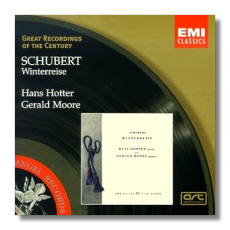
The Internet's Premier Classical Music Source
Related Links
- Schubert Reviews
- Latest Reviews
- More Reviews
-
By Composer
-
Collections
DVD & Blu-ray
Books
Concert Reviews
Articles/Interviews
Software
Audio
Search Amazon
Recommended Links
Site News
 CD Review
CD Review
Franz Schubert

Winterreise
- Song Cycle "Winterreise", 24 Songs to Miller Poems, D.911
Hans Hotter, bass-baritone
Gerald Moore, piano
EMI 67000 Monaural
As soon as I put this disc on I knew I was in for an awakening. Actually, there was a sense of déjà vu about the whole thing. If you want to avoid the existential murmurs, just go and get this disc. If nothing else, the translation is superior to the others I have in stock. For what it is worth, I compared this disc with Fischer-Dieskau's (on DG with Gerald Moore) and Schreier's (with Schiff on London) accounts. [By the way, I am going to stop giving disc numbers since the industry deletes items sans notice, Schwann Opus is often inaccurate on what is and what is not available, and the companies have a maddening tendency to sell rights off to others like Musical Heritage Society and new numbers will then be assigned. I am not complaining, but am trying to minimize inaccurate details. I make enough on my own]
Now, I know that the references are, in many ways, not comparable. There is the difference in sound reproduction between mono and stereo. Actually this is a minor point in this case because the EMI sound is so damn good. There is air around the music and a sense of depth. There is a firm bass line in the reproduction. Then there is also the difference between Hotter's bass tenor and F-D's regular one. The fact is that F-D's is a "younger" traveler, but he also speaks in clipped phrases, bringing to mind the accusation that you could make love in German and it sounds like you're swearing. Schreier, of course, is a tenor, not a bass. His is also a "younger" lost soul, but I like this one more than F-D's. The phrases aren't as sharp; there is more a sense of emotion. I will now duck.
As I first heard Hotter singing I had a sense of déjà vu, as I mentioned. I recalled an image from the mid-sixties. Walter Howard was a young history professor and he held court to a number of us "beatniks". That was the last time in my life I allowed myself to be categorized. Anyway, the music brought to mind a fall evening at Howard's apartment. It was a warm fall, the evening sun played on the brick apartments across the street. The few trees were bare. In the background, as I looked out, this music, this recording was playing. It was seared in my brain and brought out with this listening. Okay, so much for that.
On the other hand, there was a sense of awakening as I listened to this recording. I have wanted to like this piece since I read the opening lines of the first song. Still, the other two recordings left me flat. This one made me pull out the others to see if I could hear why there was this difference. What I hear here is an older, wiser lover. Here is someone who is not bitter about it, instead he is resigned. There is a sadness here, however, that I do not feel as I listen to the other recordings. I could not, and the word "could" is specifically chosen, begin to cite specific passages. For one thing there are a plethora, for another I am reacting to the gestalt here. The gestalt is that this recording has a deeper, sadder feel to it than the others I have mentioned. I even prefer Moore's contributions here over his with F-D. As with the interpretation by Hotter, Moore's playing is darker, sadder.
I already mentioned that the sound is very, very good. They don't sing 'em like this anymore. Neat stuff. Passes the "toe-tapping" test.
For what it is worth, I prefer the translation used in this EMI release over the one used in the other two. Compare:
| Just beyond the village | There beyond the village | |
| stands a hurdy-gurdy man | stands an organ grinder | |
| and with his numb fingers | and with numb fingers | |
| he plays the best he can. | he grinds as best he can. |
The first, from Hotter's disc, is from 1980 and has a flow to it the next one lacks. I also found the one in the EMI set to be easier to follow along with as I listened.
Copyright © 1999, Robert Stumpf II


















